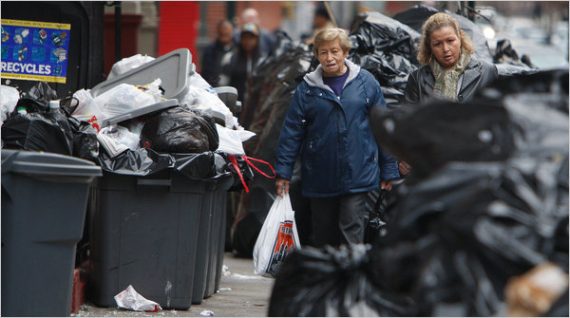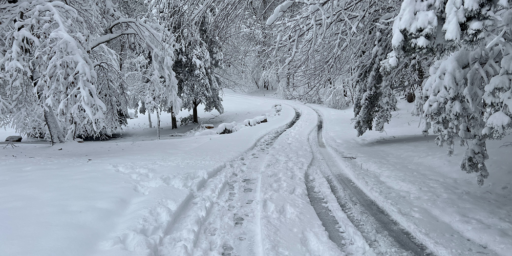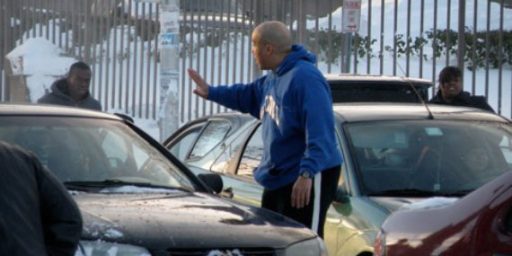Why Do People Live In New York City Again?
Yesterday, James Joyner noted one of the “joys” of living in the Big Apple; the fact that most Manhattan apartments don’t come with a washer/dryer unit.
Today, we learn that parts of Manhattan have gone ten days without residential garbage pickup thanks to Sanitation Department trucks being diverted to snow removal:
Garbage is the new snow in New York City.
Bags of trash tower on the sidewalks outside apartment buildings, while garbage cans left buried since the city’s last pickup, on Christmas Eve, poke through dirty mounds of melting snow.
New Yorkers still cursing City Hall for seldom-seen plows after the Christmas weekend snowstorm are transferring their ire to garbage trucks, which will make their first reappearances on Monday. Alternate-side parking rules will still be suspended.
But the Sanitation Department said it would resume residential garbage collection — beginning Monday at 7 a.m. — in only a “limited” fashion.
“We will have 50 percent of normal collection trucks out,” said Keith W. Mellis, a department spokesman. “We still have 50 percent of the trucks out for snow-clearing operations.”
Those who get regular Monday garbage collection, he said, should put their trash (including Christmas trees) outside, but not items to be recycled. Workers will collect the bags. Eventually.
And some people actually pay extra to live there.
Update: On the other hand, there is this news:
New York (CNN) — Many New York residents have been piling criticism on city officials over heaps of snow and uncollected garbage lining streets after last week’s blizzard. But trash bags left on one curbside may have saved a man’s life, police said.
The garbage apparently broke the fall of a man who attempted suicide by jumping from the ninth floor of a building in Midtown Manhattan Sunday, the New York Police Department said.
Police did not release the name of the man, who was still in critical condition late Sunday.
So, I suppose some good came of this







There are a lot of big money jobs, great restaurants, theater, night life, and so forth to attract the young and very wealthy. But the trade-offs are pretty steep to those used to lots of living space, the ability to park one’s car, and so forth.
Pretty sure that everyone pays extra to live in NYC, but most apartments in the midwest don’t come with washer/dryer either. As for the trash pickup, it’s a fair alternative to what a lot of us in the middle states went through in the 2007 ice storm. In fact, if I could pick between living without electricity for nine days in subzero weather and not having trash pickup for ten days, guess which one I’d pick?
As I’ve said before, if I could afford it, I’d move there in a New York minute. As for the garbage–some years ago, the garbage men went on strike during the holidays. One of more creative ways of addressing the problem by some New Yorkers, was to wrap your garbage in Christmas paper and leave it in your unlocked car…
@James – Without all those “inconveniences,” there’d be no Seinfeld show.
@DCL: True enough.
It seems quite apparent that urban areas are unable to deal with global warming. Actually, they don’t deal well with just about any disruption. The residents don’t seem to have any disaster prep or are prohibited from deepening their resilience by urban rules. First rule in any disaster, get out of town. There a big systems working to keep things flowing but disrupt any service by man-made or natural disaster and cities become hellholes quite quickly. The worst is the prohibitions on alternate ways to meet needs.
“Progressives” love cities because they require conformity of thought and enhance the nanny state. No freedom of thought when your services can experience a bureaucratic mix up.
@JKB:
I think you’ve got the causality backwards. People who live in cities tend to be Progressives because close proximity to others breeds demands for rulemaking to solve interpersonal problems and because there’s no hiding from the effects of others’ crime and poverty. If you live in the suburbs — much less the country — you simply don’t need government as much.
““Progressives” love cities because they require conformity of thought and enhance the nanny state”
Crap. My experience of big cities is that you can live a lifestyle of your own choosing. In Mayberry, good luck
9-11. Jackass.
@ James Joyner – I believe it works in a circular fashion. Living urban wears down your resistance to government control of daily life and those who prefer or desire to control others migrate to the cities. The closet nanny staters who want out of the urban environment have planned communities with neighborhood boards to move to.
@sam – unless of course your lifestyle involves the ownership of guns and the safe transport of said guns to places for safe training and recreation. We’ll skip over law abiding carrying of said guns for protection. Cities permit a lot of variation and smaller groups to congregate but they impose distinct confines on the lifestyles they tolerate.
@michael reynolds – While 9/11 was a disaster, it was actually very self contained with few wounded to stress medical facilities and a limited impact area able to be relatively easily contained by law enforcement. I do remember quite a few people spent the night sleeping on the streets unable to leave the city for their home. Fortunately, the weather was benign.
But NYC and other urban areas do not deal well with blackouts, water system failures and transportation shutdowns that last more than a few hours. Or, snow, apparently. Or disruption of garbage service. And if you’re old enough to remember, trucking strikes tend to leave the store shelves bare.
By their nature cities operate on a just-in-time delivery of supplies and services from a web of sources. Life in the city becomes difficult quite quickly if this web is disrupted.
JKB:
You’ve provided zero evidence that cities have trouble coping with disasters.
On the contrary, it seems the rustics with their eternal tornados, floods and forest fires have the problems: they have no nearby hospitals, no nearby EMS, no shelters, often just a single road into or out of town, no close facilities for air evacuation, no local tax base to cover the cost of rescue and repairs.
Which no doubt explains why rural areas are a taxpayer sinkhole absorbing an endless stream of money from the more productive cities and suburbs. Well, that plus the fact that anyone with a talent, a skill, or even just a wee bit of ambition has gotten the hell out of Buttcrack and moved to Gotham, so there’s no one left whose capable of organizing a two car parade.
Save your small town hubris. There’s a reason you’re small.
@JKB
“Cities permit a lot of variation and smaller groups to congregate but they impose distinct confines on the lifestyles they tolerate.”
Geez, there’s no simple way to say this other than, you’re full of shit.
JKB you sound like an intelligent chap and what you say is so off the mark, that it crossed my mind that you are just trying to be provocative here. NYC is SO much more tolerant than small town USA. Confines on lifestyles? Are you kidding? Anything goes in NYC.
@michael reynolds – do you even know where your food comes from? All those people who keep American farms and ranches the most productive in the world have no talent, skill or ambition?
But I’m not saying city bad, country good. I simply pointed out that dense urban populations are at risk if their safety net or supply lines are disrupted. Rural populations are not as vulnerable simply because their sparsely populated nature requires they be prepared to be responsible for themselves.
But even in the remotest parts of the US, we live with a big safety net. But that safety net can fail. Want to guess how responsive EMS was in New Orleans the weeks after Katrina? Most people do not realize the risks they live with such as not being able to get to the hospital during a snow storm because the street plowing isn’t getting done. Or that food deliveries into the city can be slowed. Or the power can go out with no way to heat or cool, or water. It is because the cities work so well that they can become such difficult places to exist when they don’t.
“But I’m not saying city bad, country good.”
Your comments seem to tell a different story…
You know what I love? The Internet, it gives us access to data so we don’t have to bicker like silly children making intuitive claims that make us feel good about where we’ve personally chosen to live.
Now, personally, I wouldn’t live in NYC and sympathize with JKB. I do find NYC to be the city with the least interesting art, food, and culture. I see no particular amenities to living in a crappy shopping mall.
But, I’ll just go ahead and leave some actual information here:
“4. Urban-Rural Differences. A comment should also be made concerning urban-
rural differences on family recovery. As crucial as this variable has been in
explaining different patterns of family life, it has not received much systematic
attention from disaster researchers. One reason for this omission is probably
due to the single, case study method used in studying disaster events. However,
Bolin (1982) was able to make some observations about the influences of residential location–that is, family residence in an urban or rural environment–in his comparative study of disaster events. Rural victims were found to use their kin group as a source of emergency shelter more often than did urban victim families.”
University of Delaware Disaster Research Center PRELIMINARY PAPER #219 DISASTER RECOVERY AS A SOCIAL PROCESS Joanne M. Nigg 1995
but…
“The mean response time for urban locations was 7.0 minutes (median = 6 minutes) compared with 13.6 minutes (median = 12 minutes) for rural locations (p < 0.0001). The mean scene time in rural areas was slightly longer than in urban areas (21.7 vs. 18.7 minutes, p = 0.015). Mean transport times from the scene to the hospital were also significantly longer for rural incidents (17.2 minutes vs. 8.2 minutes, p < 0.0001). Rural victims were over seven times more likely to die before arrival (relative risk = 7.4, 95% confidence interval 2.4-22.8) if the emergency medical services' response time was more than 30 minutes."
Journal of Trauma-Injury Infection & Critical Care: April 1997 – Volume 42 – Issue 4 – pp 723-729
Urban-rural Differences in Prehospital Care of Major Trauma Grossman, David C. MD
but on a similar note…
"It is estimated that most large companies spend between 2% and 4% of their IT budget on disaster recovery planning, with the aim of avoiding larger losses in the event that the business cannot continue to function due to loss of IT infrastructure and data. Of companies that had a major loss of business data, 43% never reopen, 51% close within two years, and only 6% will survive long-term"
Hoffer, Jim. "Backing Up Business – Industry Trend or Event." Health Management Technology, Jan 2001
I cant even believe you guys really arguing that larger human systems dependent on services that must operate regularly and quickly don't have large scale disruption when those services are blocked. I'm going to have to ask: what do you think would happen in NYC if the food trucks couldn't come for five days? or if the water stopped getting shipped in from far further north?
Answer: the same thing that would happen to any are that has little physical resources like its own water, food supply, etc.
Personally, I like Key West.
It’s because New York is sexy!